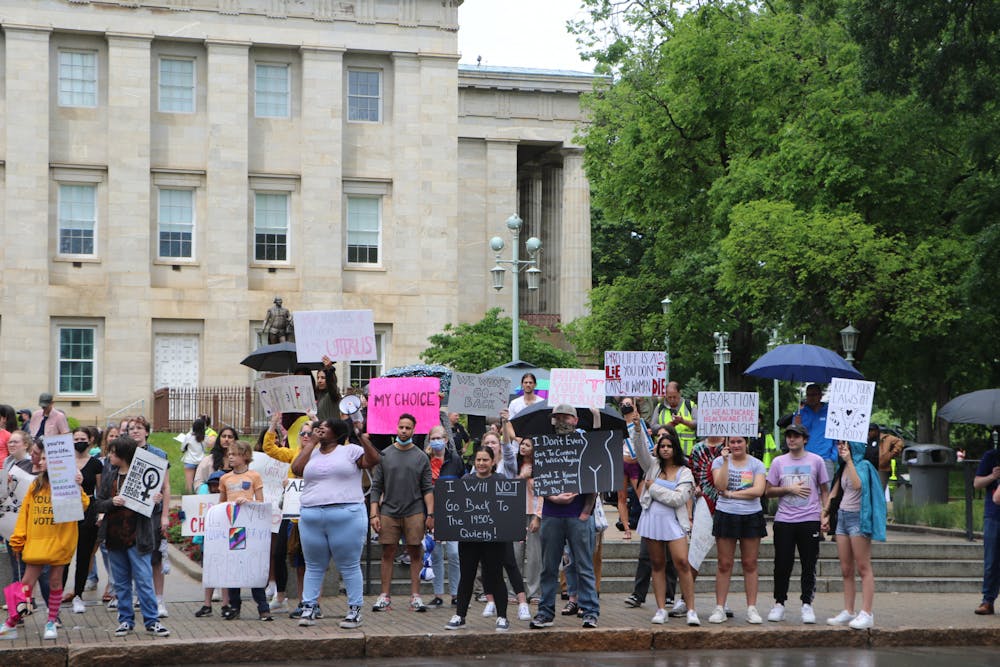After Justice Samuel Alito’s draft Supreme Court opinion leaked on May 2, the potential overturning of Roe v. Wade, the landmark decision upholding the constitutional right to abortion, puts the availability of secure access to abortion services in legal limbo.
Without federal protection of abortion rights, state legislatures would have the discretion to decide on abortion legality. In the Republican-held North Carolina General Assembly, legislation to implement a post-viability abortion ban may be on the table.
Though the NCGA is dominated by conservatives, North Carolina remains an enclave for abortion-seekers in the South partly because the state’s Democratic governor, Roy Cooper, holds veto power.
Already, 18% of patients who obtain abortions in N.C. are residents of other states. If Roe is overturned, more out-of-state abortion seekers may come here, due to so-called “trigger bans” passed in the nearby states of Tennessee, Louisiana and Mississippi. These laws call for immediate abortion bans in a potential post-Roe world.
But even without a trigger law, North Carolina is an “interesting case” due to the state having both a pre-Roe abortion ban and a post-Roe abortion protection law in criminal code, according to Meghan Boone, associate professor of law at Wake Forest University.
“As a result, it's a little unclear what exactly will happen after Roe is no longer a viable federal law in the face of these somewhat conflicting portions of our criminal code,” Boone said.
Abortion access in the state remains heavily regulated by mandatory state-directed counseling, a 72 hour waiting period, parental consent requirements for minors and mandatory ultrasounds. Only nine of the state’s 100 counties currently have abortion clinics.
If Roe is overturned, North Carolina could enforce a post-viability ban on abortion, which has been on the books since 1973. This would outlaw any abortion treatment after the patient’s 20th week of gestation.
A federal lawsuit previously ruled this post-viability ban unconstitutional under Roe. Therefore, abortion clinics throughout the state are not currently obliged to comply with this law. If the Supreme Court overturns Roe, this post-viability clause could become constitutional in North Carolina.
With the exception of this 20-week restriction, abortion will likely remain legal so long as Cooper, a proponent of abortion rights, remains in office. However, upcoming elections in North Carolina may alter the trajectory of reproductive rights in the state. Anti-abortion Republicans could obtain a veto-proof supermajority in the NCGA by winning 60% of seats in the upcoming 2022 elections.
Thomas Williams, clinical professor of law at Duke Law School, said, “I think there would be a strong expectation that even with a Democratic governor in place in 2024, you have to keep your eyes on the size of the Republican majority in the state houses.”
If Republicans are unable to win a supermajority in 2022, the 2024 elections will present a fresh opportunity for the GOP. Cooper’s term ends in 2024, and electing a Republican governor would open the doors for more restrictive abortion laws to be enacted.
“I think if [Democrats] don't hold onto the governorship in 2024, we will go the way of other Southern states; there will surely be some type of ban,” Boone said.
Recent polling suggests that a majority of North Carolina residents endorse abortion access.
District attorneys have the discretion to enforce potential new criminal codes in their districts. Regardless of Roe’s future, Durham County DA Satana Deberry has vowed to refrain from prosecuting healthcare providers or women.
Get The Chronicle straight to your inbox
Signup for our weekly newsletter. Cancel at any time.
Halle Friedman is a Trinity senior and an associate news editor of The Chronicle's 119th volume.

